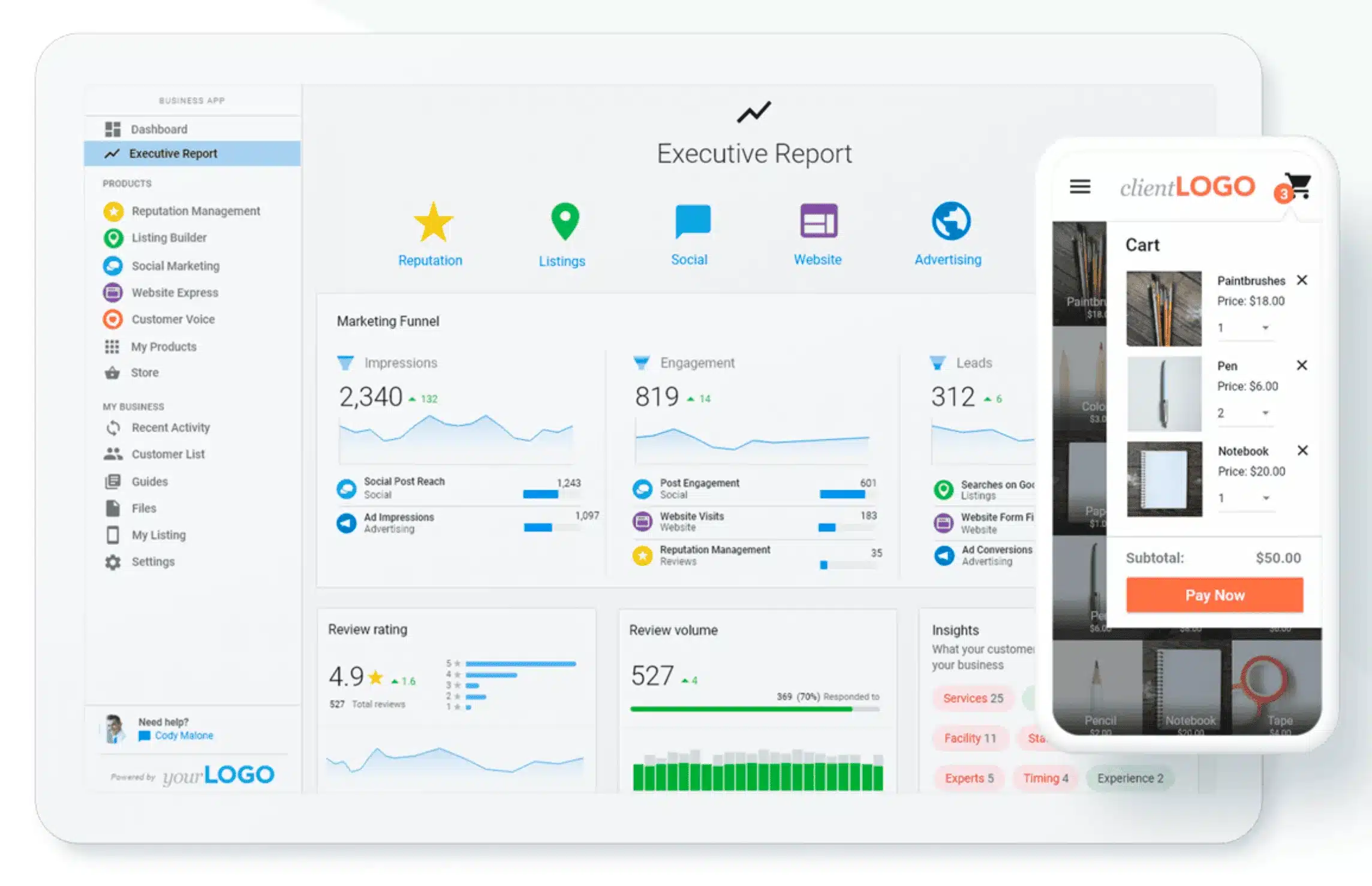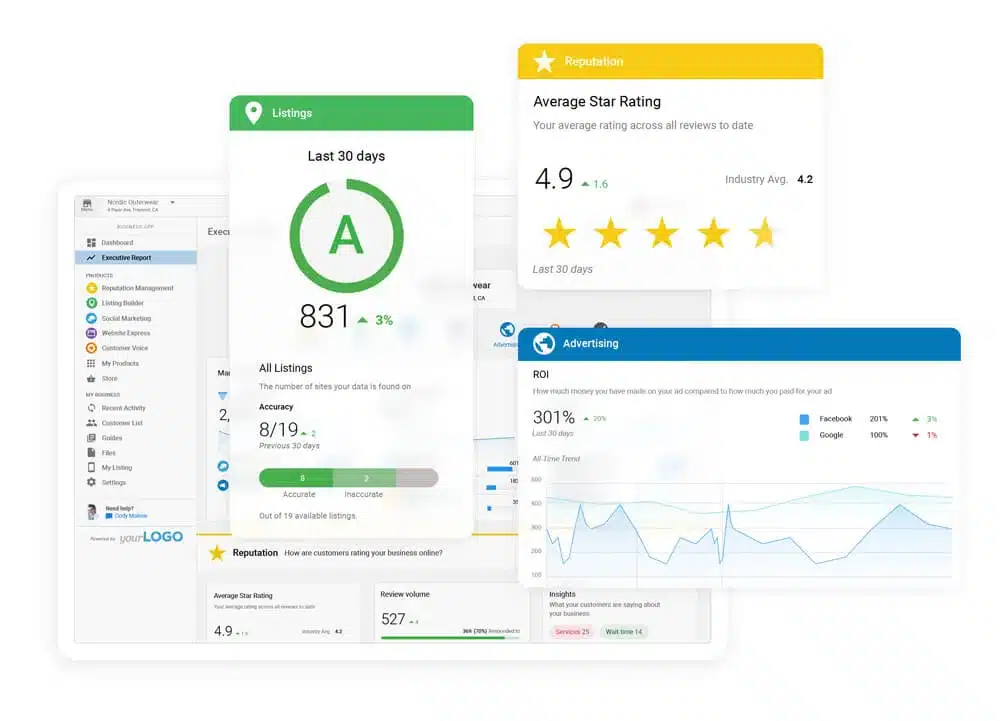Client management is not just a buzzword—it’s a vital practice that can significantly impact the success of your agency. As digital marketing agencies continue to expand their portfolios and client bases, the ability to effectively manage clients becomes increasingly important.
Client management goes beyond maintaining client relationships; it’s about building trust, ensuring consistent communication, and delivering exceptional service that leads to long-term success.
For agencies, the importance of client management cannot be overstated. It’s the backbone of your business relationships, influencing everything from client retention to the overall quality of service delivery.
By prioritizing client management, agencies can create a more organized and streamlined approach to handling client needs, leading to better outcomes, increased client satisfaction, and, ultimately, business growth.
Whether it’s through regular client communication, strategic client onboarding processes, or comprehensive client satisfaction surveys, the way you manage your clients will define your agency’s reputation and success. We’ll cover all of this below.
Acquire and serve 10x more clients with AI-powered software
Understanding Client Management
Client management is the practice of systematically organizing, monitoring, and nurturing relationships with clients to ensure their needs are met and expectations are exceeded.
While the terms “clients” and “customers” are often used interchangeably, they refer to different types of relationships. Clients are typically those who have an ongoing relationship with your agency, requiring continuous interaction, personalized services, and a deeper understanding of their business needs.
In contrast, customers might engage in one-off transactions with less need for ongoing relationship management.
The Importance of Client Management
The importance of client management for digital marketing agencies cannot be underestimated. Maintaining strong client relationships is crucial for several reasons.
Firstly, it directly impacts client retention. When clients feel valued and understood, they are more likely to remain loyal to your agency, reducing churn and increasing lifetime value.
Secondly, effective client management enhances the overall quality of service delivery. By understanding your clients’ industries, expectations, and pain points, you can tailor your services to meet their specific needs, leading to higher satisfaction and better results.
Furthermore, robust client relationship management lays the foundation for trust, which is essential in long-term business relationships. Trust is built through consistent, transparent communication and by demonstrating a thorough understanding of your clients’ industries.
By investing in automation tools like Vendasta that support client management, agencies can improve efficiency while maintaining a personal touch that clients appreciate.  Grow your agency by mastering client management and watch as your ability to retain clients and deliver top-tier services reaches new heights.
Grow your agency by mastering client management and watch as your ability to retain clients and deliver top-tier services reaches new heights.
Key Skills & Principles of Effective Client Management
Honesty and Transparency
At the core of effective client management is honesty and transparency. Being upfront about timelines, project progress, and any potential issues is essential for maintaining trust and credibility with clients.
When clients are informed about project status and potential challenges, it fosters a sense of reliability and respect. This transparency helps in managing client expectations and can mitigate potential dissatisfaction or conflicts.
Communication
Effective client management relies heavily on communication. Regular and clear communication ensures that clients are always in the loop regarding their projects. It’s essential to identify and use preferred communication methods, whether that’s through email, phone calls, or messaging apps.
By aligning your communication style with client preferences, you make interactions more efficient and pleasant. This includes setting up regular check-ins and updates to keep clients informed and engaged.
Trust Building
Trust is a cornerstone of successful client management. Building trust involves understanding your client’s industry jargon and needs deeply. This demonstrates not only your expertise but also your commitment to their business.
Strategies for building trust include personalized interactions, consistent follow-ups, and showing genuine interest in their goals and challenges. When clients see that you are invested in their success, they are more likely to remain loyal and supportive.
Expectation Setting
Setting realistic expectations is vital in client management. Clearly outlining what clients can expect in terms of deliverables, timelines, and outcomes helps prevent misunderstandings and disappointments.
By establishing achievable goals and providing realistic estimates, you ensure that clients have a clear understanding of what to expect throughout the project lifecycle.
Client Management Best Practices
Prioritizing Existing Clients
Focusing on current clients is a fundamental aspect of client management. Retaining existing clients often requires more effort than acquiring new ones, but it’s crucial for long-term success.
Prioritizing existing clients involves maintaining regular contact, addressing their needs promptly, and ensuring their satisfaction. Satisfied clients are more likely to become repeat customers and provide valuable referrals.
Client Onboarding Process
An effective client onboarding process sets the tone for your agency’s relationship with new clients. It’s essential to make a strong first impression by clearly communicating expectations, timelines, and the value your services will provide.
For an in-depth look at the best client onboarding strategies that aren’t commonly discussed, check out this insightful YouTube video on the best client onboarding strategies that nobody talks about:
This video dives into innovative approaches that can set your agency apart, helping you to enhance client relationships right from the start and ensuring a smooth, successful onboarding process that leads to long-term client satisfaction and increased business growth.
Listening to Client Needs
Understanding and addressing client needs is central to effective client management. By actively listening to your clients and comprehending their goals, you can tailor your services to better meet their expectations.
This client-centric approach not only enhances service delivery but also strengthens the client relationship by demonstrating that you are attentive to their unique requirements.
Organizational Skills
Good client management requires excellent organizational skills. Keeping the team updated on client status, project progress, and communications ensures that everyone is aligned and informed.
An organized approach helps in managing multiple clients efficiently and ensures that no details are overlooked. Utilizing tools and systems to track client interactions and project milestones can greatly enhance organizational efficiency.
For further insights and resources on client management best practices, check out Vendasta’s Client Relationships and Client Communication blogs. These resources offer practical advice on how to maintain strong client relationships and effective communication strategies.
Client Management Systems and Tools
Overview
A client management system is a comprehensive suite of tools designed to help businesses manage their interactions with clients efficiently. These systems typically include components such as project management software and CRM (Customer Relationship Management) tools.
Project management software helps agencies track project progress, manage deadlines, and collaborate with clients on tasks and deliverables. On the other hand, CRM software focuses on managing client information, tracking interactions, and nurturing client relationships. Together, these tools provide a unified platform for handling various aspects of client management.
Benefits
Implementing a robust client management system offers several advantages. Firstly, these systems facilitate better communication by providing a centralized platform where all client-related interactions are recorded and easily accessible. This ensures that team members are always informed about client needs and project updates, reducing the risk of miscommunication.
Additionally, client management systems help in reducing errors by automating routine tasks, such as scheduling and follow-ups. This automation minimizes the likelihood of human errors and ensures that clients receive timely and accurate information.
Vendasta Solutions
Vendasta’s robust CRM for agencies helps streamline client management, strengthen relationships, and improve service delivery at every stage.. Here’s an overview of how Vendasta helps agencies manage their clients effectively:
Client Onboarding Tools
Vendasta provides automated onboarding workflows, making it easier for agencies to introduce new clients to the platform. The system guides new clients through step-by-step onboarding processes, ensuring they quickly understand how to use the tools provided.
Business App Portal
Each client gets access to their own customizable Business App. In this client-facing portal, they can view reports, track performance, and access the products or services provided by the agency. This self-serve option allows clients to stay updated and informed in real-time.

CRM (Customer Relationship Management)
Vendasta’s built-in CRM allows agencies to manage client communications, track deals, and monitor sales pipelines in one place. It centralizes client information, making it easier to keep track of conversations, progress, and opportunities.
Task and Project Management
Agencies can assign tasks, track project timelines, and manage client deliverables, all within Vendasta’s platform. This helps ensure that deadlines are met, and projects stay on track, improving client satisfaction.
Client Reporting and Analytics
Agencies can generate white-label performance reports that provide insights into marketing campaigns, sales growth, and overall business performance. These reports can be shared automatically with clients on a scheduled basis, ensuring transparency.

Reputation Management Tools
Vendasta’s reputation management tools enable agencies to monitor and manage their clients’ online presence and reviews, making it easy to respond to customer feedback and address reputation issues quickly.
Scalability for Growing Client Bases
As agencies grow, Vendasta’s platform scales with them. Agencies can manage multiple clients, track separate accounts, and offer new services—all from one dashboard, making client management efficient and scalable.
In summary, Vendasta offers agencies a complete client management solution that automates many key processes, enhances communication, improves reporting, and ultimately strengthens client relationships, all while being scalable and easy to use.
Automation in Client Management
Role of Automation
Automation plays a crucial role in modern client management by streamlining communications and service delivery. It enables agencies to automate routine tasks, such as sending follow-up emails, scheduling appointments, and updating client records. By leveraging automation, agencies can ensure consistent and timely communication with clients, reducing the manual workload and freeing up time for more strategic activities.
Examples
Several automation tools can enhance client management. For instance, chatbots can handle routine inquiries, providing instant responses to common questions and freeing up human resources for more complex issues. AI-driven tools can analyze client interactions and predict needs, allowing for more personalized and proactive service. These examples illustrate how automation can improve efficiency and client satisfaction by delivering timely and relevant information.
Vendasta Integration
Vendasta’s automation tools can be seamlessly integrated into your existing client management processes to enhance efficiency. For example, Vendasta’s automation solutions can be used to set up automated email campaigns, manage client follow-ups, and track engagement metrics.
By incorporating Vendasta’s tools, agencies can streamline their workflows, reduce administrative overhead, and ensure that clients receive consistent and high-quality service. Learn more about Vendasta’s automation capabilities and how they can benefit your agency by visiting our blog on client collaboration.
Challenges and Pitfalls in Client Management
Common Pitfalls
Effective client management requires vigilance to avoid several common pitfalls. One major mistake is neglecting existing clients in favor of pursuing new ones. This can lead to diminished client satisfaction and potentially lost business.
Another common issue is disorganization, which can result in missed deadlines, miscommunications, and overall inefficiency. When client interactions are not tracked systematically, it’s easy for important details to slip through the cracks, impacting the quality of service and client trust.
Solutions
To avoid these pitfalls, adopting a structured approach to client management is essential. Implementing a client management system can help keep track of client interactions, project status, and deadlines, ensuring that no client is overlooked. Regularly scheduled check-ins and updates with clients can also help maintain strong relationships and prevent neglect.
Additionally, establishing clear processes and using organizational tools can help mitigate the risks associated with disorganization. By integrating strategies such as consistent communication, automated follow-ups, and comprehensive project tracking, agencies can enhance their client management practices and avoid common pitfalls.
Measuring Success in Client Management
KPIs and Metrics
Measuring the success of your client management efforts involves tracking key performance indicators (KPIs) and metrics. Some essential KPIs include client satisfaction scores, retention rates, and the frequency of client interactions.
These metrics provide valuable insights into how well your client management practices are performing and highlight areas for improvement. For example, high client satisfaction scores indicate that your client management strategies are effective, while low retention rates may signal a need for adjustments in your approach.
Continuous Improvement
Regularly reviewing and improving client management processes is crucial for ongoing success. This involves analyzing performance data, gathering feedback from clients, and making necessary adjustments to enhance service delivery.
Continuous improvement helps agencies stay aligned with client expectations, adapt to changing needs, and refine their strategies for better results. By regularly assessing and optimizing your client management practices, you can ensure sustained client satisfaction and business growth.
Conclusion
In conclusion, effective client management is essential for the success of digital marketing agencies. By avoiding common pitfalls, leveraging robust client management systems, and continually improving processes, agencies can enhance client relationships and deliver exceptional service. Tools like Vendasta’s CRM and project management solutions can play a pivotal role in streamlining client management and achieving better outcomes.
To maximize the benefits of client management, agencies should embrace best practices and consider integrating Vendasta’s solutions into their workflows. Adopting these strategies will not only improve client satisfaction but also drive long-term success and growth for your agency.
Transform your client relationships with Vendasta’s powerful tools. Explore Vendasta’s solutions and start driving better results for your agency today!
FAQs
1. What is client management?
Client management is the process of organizing, nurturing, and maintaining relationships with clients to ensure satisfaction and long-term success. It involves clear communication, trust-building, and delivering value consistently, making it a critical component for digital marketing agencies.
2. Why is client management important for agencies?
Effective client management boosts retention, builds trust, and strengthens service delivery. By understanding client goals and maintaining transparency, agencies can foster long-lasting partnerships that reduce churn, increase referrals, and fuel sustainable growth.
3. What are the key skills needed for successful client management?
Strong communication, transparency, organizational skills, and expectation setting are essential. These skills help agencies keep clients informed, manage projects effectively, and build trust that translates into loyalty and long-term relationships.
4. How does Vendasta help with client management?
Vendasta provides agencies with a white-label CRM, client onboarding workflows, and client-facing portals. These tools streamline communications, automate reporting, and improve client engagement, making it easier to manage relationships at scale while maintaining a personal touch.
5. What is the difference between client management and customer management?
Customer management often refers to transactional relationships, while client management involves ongoing, personalized interactions. Clients expect deeper collaboration, tailored solutions, and regular communication—making structured client management critical for service-based businesses like agencies.
6. Do small agencies need a client management system?
Yes. Even small agencies benefit from using a client management system. It helps track communications, projects, and deliverables, ensuring no details are missed. A system like Vendasta’s CRM makes it possible to manage clients efficiently and professionally, even with limited staff.
7. How can automation improve client management?
Automation streamlines repetitive tasks such as sending follow-up emails, scheduling meetings, and generating reports. This ensures consistent communication, reduces human error, and frees up teams to focus on delivering strategy and value-added services.
8. How does client management impact client retention?
Strong client management builds trust and ensures clients feel valued. Regular check-ins, transparent reporting, and proactive problem-solving make clients more likely to stay loyal. High retention reduces churn and increases lifetime value, making it a key business growth driver.
9. What tools are most effective for client management?
Effective client management often involves CRMs, project management software, and reporting tools. Vendasta combines these features in one platform, offering automation, analytics, and branded client dashboards that improve collaboration and demonstrate value clearly.
10. How do agencies measure success in client management?
Agencies track metrics like client satisfaction scores, retention rates, and project delivery timelines. High engagement and repeat business signal strong client management. Tools like Vendasta’s reporting dashboards make it easy to measure performance and showcase ROI to clients.


